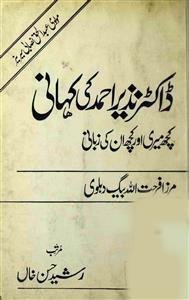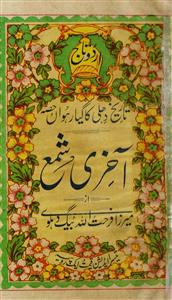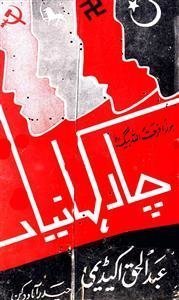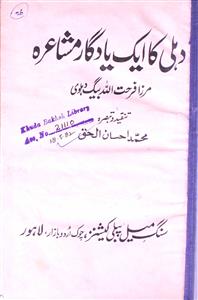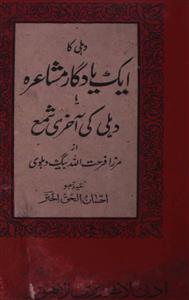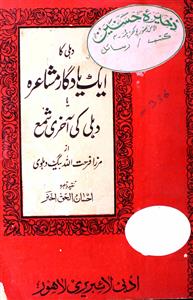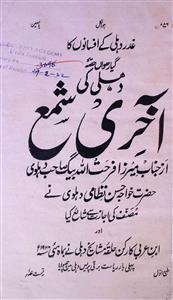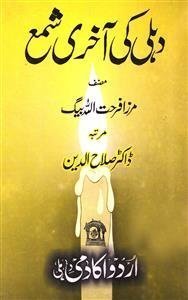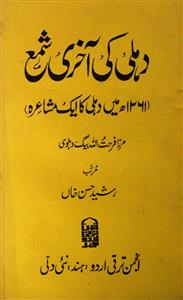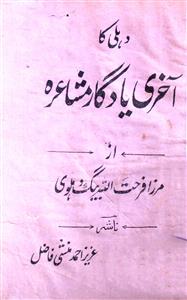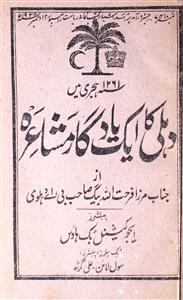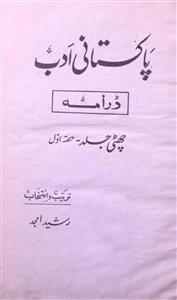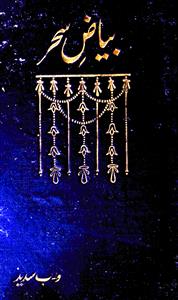 For any query/comment related to this ebook, please contact us at haidar.ali@rekhta.org
For any query/comment related to this ebook, please contact us at haidar.ali@rekhta.org
About The Book
ڈاکٹر نذیر احمد،فرحت اللہ بیگ کے استاد تھے۔ یہ خاکہ مولوی عبد الحق صاحب کے اصرار پر ۱۹۲۷ میں لکھا گیا تھا۔تنقید نگاروں نے اسے اردو کا پہلا مکمل خاکہ کہا ہے۔اس خاکے میں فرحت اللہ بیگ کی کردار نگاری،مرقع نگاری اور ظرافت اپنے عروج پر ہے۔اس کتاب کی اہمیت اس لیے بھی ہے کہ ڈاکٹر نذیر احمد پر یہ خاکہ فرحت اللہ بیگ کی چشم دید اوربراہِ راست معلومات پر مبنی ہے،اور اس کے ذریعے زمانے کے احوال اورزبان کا پتا چلتا ہے۔ اس خاکہ میں فرحت اللہ بیگ نے نذیراحمد کی دلچسپ شخصیت کا اس طرح نقشہ کھینچا ہے کہ ممدوح کا حلیہ،چال ڈھال،کراروگفتار،کھاناپینا،بات چیت،نشست و برخاست،علم سے وابستگی،ان کےکاروبارغرض ان کی ہر ادا، ہر حرکت لفظوں میں سمودی۔اس خاکے کے مطالعےسےڈپٹی نذیراحمدخود چلتے پھرتےنظرآتےہیں۔خاکےکااسلوب مزاحیہ ہے۔بامحاورہ زبان،نپےتلے جملے، ضرب الامثال کےساتھ ظرافت کی آمیزش،کہاوتوں کے برمحل استعمال نے اس خاکےکومزیدتابناک کیا ہے۔
About The Author
Mirza Farhatullah Baig is among Urdu Satire’s most popular names. His Khakaa, or Sketches, are quite distinguished and his natural sense of humor is instrumental in making them dear to every reader’s heart.He wrote on various topics. He turned his attention to criticism, fiction, biography, biography, society and morals, but his real fame revolved around humorous literature.
He was a resident of Delhi. His ancestors came from Turkestan during the reign of Shah Alam II and made Delhi their homeland. Mirza was born here in 1884, and his early education also took place here. While studying in college, he met Maulvi Nazir Ahmed. He not only learned Arabic language and literature from him but also accepted the profound influence of his personality. After graduation he went to Hyderabad. He held various positions there and died in 1947.
His book "Dilli ka Akhiri Mushaira" is a paragon of muraqqa’ painting. He had seen Maulvi Nazir Ahmad very closely and for many years. He masterfully portrayed Nazir Ahmad in his Khaaka, “Maulvi Nazir Ahmad Ki Kahaani, Kuch Un Ki Kuchh Meri Zabaani”. This Khaaka gave him eternal fame. Maulvi Wahiduddin Saleem liked this Khaaka so much that he summoned Baig to write one on him. After Saleem’s death, Mirza complied with this order and named the Khaaka “Ek Vasiiat Kii Taamiil Mein '' .He wrote a large number of articles which have been published in seven volumes under the name of Farhat. He also wrote poetry but this is not his forte.
He has great command over the everyday language of Delhi and humor is the hallmark of his writing. Reading his articles, the reader gets a mental pleasure. When he writes on a subject or a person, he does not ignore the small things. This detailing is all the more pleasing to the reader.
Mirza Farhatullah Baig is actually a satirist. One of the reasons for their popularity is that he protects his writings from a forced philosophical depth and seriousness as much as possible. And tries to make the reader enjoy themselves as much as possible.
 For any query/comment related to this ebook, please contact us at haidar.ali@rekhta.org
For any query/comment related to this ebook, please contact us at haidar.ali@rekhta.org
Write a Review
Jashn-e-Rekhta 10th Edition | 5-6-7 December Get Tickets Here
